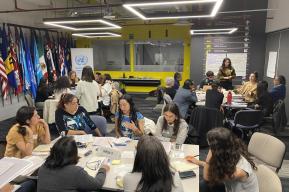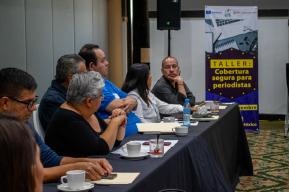
International Day for Universal Access to Information
Recognizing the significance of access to information, the 74th UN General Assembly proclaimed 28 September as the International Day for Universal Access to Information (IDUAI) at the UN level in October 2019. The day had been proclaimed by the UNESCO General Conference in 2015, following the adoption of the 38 C/Resolution 57 declaring 28 September of every year as International Day for Universal Access to Information (IDUAI).
UNESCO provides a platform and frame for all the stakeholders to participate in international discussions on policy access to information in the digital era as it empowers individuals, enables informed decision-making, fosters innovation, and promotes inclusivity and social progress.
Global Conference on Universal Access to Information 2023
The International Day for Universal Access to Information focused on the importance of the online space for Access to Information.
The global celebration took take place in Oxford, UK on the 28 September 2023. The Opening session was followed by the High-level roundtable, which discussed access to information and internet disruptions in the context of the Vienna Declaration adopted at the World Conference on Human Rights.
A series of three panels focused on Internet accessibility and connectivity; the role of governments, judiciary and information commissioners in securing the proper functioning of internet as an enabler of the right to information and other human rights; as well as the need for international cooperation in the field of strengthening access to information for human rights and achievement of the Goals of Agenda 2030.
Understanding the importance of the International Day for Universal Access to Information in today's context of digitalization
Spotlight on two prominent experts, Mr Kanbar Hossein Bor, Head Democratic Governance and Media Freedom Department at the Foreign, Commonwealth and Development Office, and Mr Guilherme Canela De Souza Godoi, Chief of Section, Freedom of Expression and Safety of Journalists, UNESCO, discussing access to information and its importance especially in the digital era.
They shed light on the incipit of the International day for Universal Access to Information and the reason behind its commemoration under this year's theme: the importance of the online space for access to information. How everyone can get involved and what are the main expected outcomes of the global event?

"UNESCO works to protect and promote access to information as a fundamental human right and an essential step towards attainment of the Sustainable Development Goals. As part of these efforts, the United Nations General Assembly proclaimed 28 September as the International Day for Universal Access to Information – recognizing its role in development, democracy and equality."

IDUAI over time: Access to Information and its international recognition from 2016 to 2022
Equal and Universal Access to Information is essential to promote human rights and dignity, to eradicate poverty and to build inclusive knowledge societies.
The International Day for Universal Access to Information aims at spreading awareness concerning the need to expand laws related to information and their actual implementation. The expansion of these laws helps in building inclusive institutions access the world.
UNESCO declared on 17 November 2015 that the International Day for Universal Access to Information will be marked and celebrated on 28 September every year.
The 74th UN General Assembly proclaimed 28 September as the International Day for Universal Access to Information (IDUAI) at the UN level in October 2019.
Since 2016, the celebration of the International Day for Universal Access supported by UNESCO spanned from 20 to 26 countries, spreading awareness on our Right to Access Information.

YouTube Playlist
News


Read the proclamation











